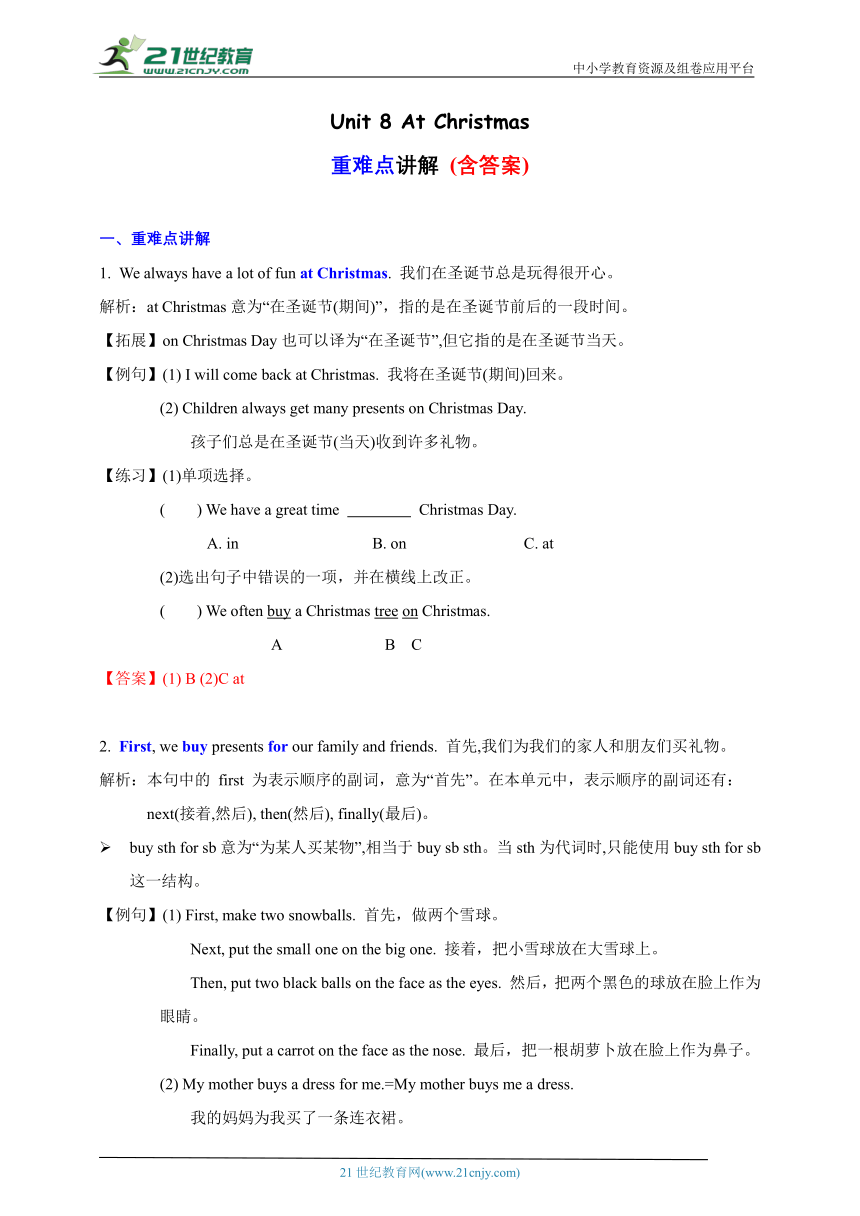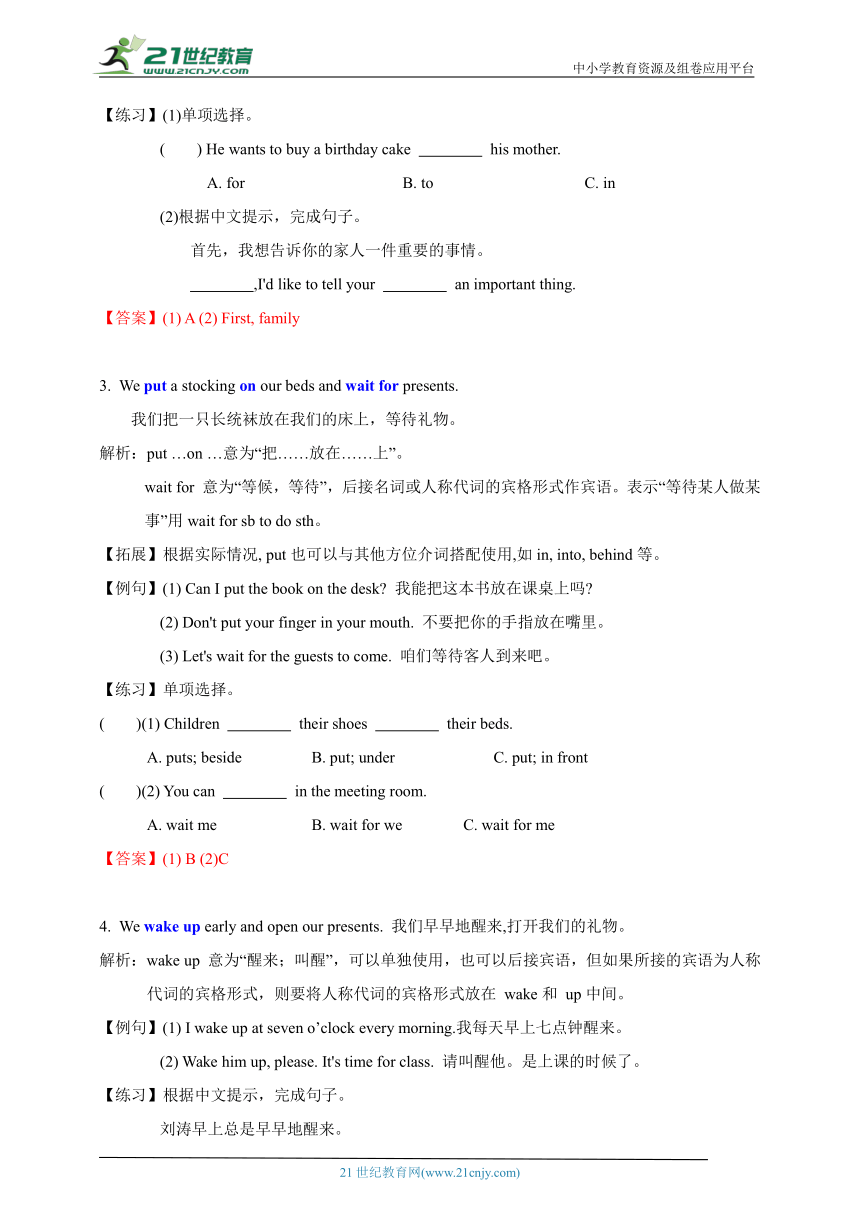Unit 8 At Christmas重难知识点(复习讲义)-2023-2024学年五年级英语上册(译林版三起)(含答案)
文档属性
| 名称 | Unit 8 At Christmas重难知识点(复习讲义)-2023-2024学年五年级英语上册(译林版三起)(含答案) |  | |
| 格式 | doc | ||
| 文件大小 | 1.3MB | ||
| 资源类型 | 试卷 | ||
| 版本资源 | 牛津译林版 | ||
| 科目 | 英语 | ||
| 更新时间 | 2023-09-12 20:35:45 | ||
图片预览


文档简介
中小学教育资源及组卷应用平台
Unit 8 At Christmas
重难点讲解 (含答案)
重难点讲解
We always have a lot of fun at Christmas. 我们在圣诞节总是玩得很开心。
解析:at Christmas意为“在圣诞节(期间)”,指的是在圣诞节前后的一段时间。
【拓展】on Christmas Day也可以译为“在圣诞节”,但它指的是在圣诞节当天。
【例句】(1) I will come back at Christmas. 我将在圣诞节(期间)回来。
(2) Children always get many presents on Christmas Day.
孩子们总是在圣诞节(当天)收到许多礼物。
【练习】(1)单项选择。
( ) We have a great time Christmas Day.
A. in B. on C. at
(2)选出句子中错误的一项,并在横线上改正。
( ) We often buy a Christmas tree on Christmas.
A B C
【答案】(1) B (2)C at
First, we buy presents for our family and friends. 首先,我们为我们的家人和朋友们买礼物。
解析:本句中的 first 为表示顺序的副词,意为“首先”。在本单元中,表示顺序的副词还有:
next(接着,然后), then(然后), finally(最后)。
buy sth for sb意为“为某人买某物”,相当于buy sb sth。当sth为代词时,只能使用buy sth for sb 这一结构。
【例句】(1) First, make two snowballs. 首先,做两个雪球。
Next, put the small one on the big one. 接着,把小雪球放在大雪球上。
Then, put two black balls on the face as the eyes. 然后,把两个黑色的球放在脸上作为眼睛。
Finally, put a carrot on the face as the nose. 最后,把一根胡萝卜放在脸上作为鼻子。
(2) My mother buys a dress for me.=My mother buys me a dress.
我的妈妈为我买了一条连衣裙。
【练习】(1)单项选择。
( ) He wants to buy a birthday cake his mother.
A. for B. to C. in
(2)根据中文提示,完成句子。
首先,我想告诉你的家人一件重要的事情。
,I'd like to tell your an important thing.
【答案】(1) A (2) First, family
We put a stocking on our beds and wait for presents.
我们把一只长统袜放在我们的床上,等待礼物。
解析:put …on …意为“把……放在……上”。
wait for 意为“等候,等待”,后接名词或人称代词的宾格形式作宾语。表示“等待某人做某事”用wait for sb to do sth。
【拓展】根据实际情况, put也可以与其他方位介词搭配使用,如in, into, behind等。
【例句】(1) Can I put the book on the desk 我能把这本书放在课桌上吗
(2) Don't put your finger in your mouth. 不要把你的手指放在嘴里。
(3) Let's wait for the guests to come. 咱们等待客人到来吧。
【练习】单项选择。
( )(1) Children their shoes their beds.
A. puts; beside B. put; under C. put; in front
( )(2) You can in the meeting room.
A. wait me B. wait for we C. wait for me
【答案】(1) B (2)C
We wake up early and open our presents. 我们早早地醒来,打开我们的礼物。
解析:wake up 意为“醒来;叫醒”,可以单独使用,也可以后接宾语,但如果所接的宾语为人称代词的宾格形式,则要将人称代词的宾格形式放在 wake和 up中间。
【例句】(1) I wake up at seven o’clock every morning.我每天早上七点钟醒来。
(2) Wake him up, please. It's time for class. 请叫醒他。是上课的时候了。
【练习】根据中文提示,完成句子。
刘涛早上总是早早地醒来。
Liu Tao always in the morning.
【答案】wakes up early
We all have a good time! 我们都玩得很高兴!
解析:have a good time 意为“过得愉快,玩得高兴”,其同义短语有have a lot of fun, have great fun 等。
【例句】The children have a good time in the park. 孩子们在公园玩得很高兴。
【练习】按要求完成句子。
They have a good time at the Christmas party.(改为同义句)
They have at the Christmas party.
【答案】great fun
What's wrong with him 他怎么了
解析:句型“What’s wrong with ... ”意为“……怎么了 ”,用来询问他人的身体情况或遇到的问题,相当于“What’s the matter with ... ”。其中,介词with后接名词或人称代词的宾格形式。
【例句】—What's wrong with you 你怎么了 —I have a headache. 我头疼。
【练习】用所给单词的适当形式填空。
--What’s wrong with (she)
-- (she) is hungry.
【答案】her, She
易错易混全解
易混淆 for 与 to的用法。
【例题】根据中文提示,完成句子。
(1)我们为我们的老师买一些玫瑰。
We some roses our teacher.
(2)我们在教师节给我们的老师一张贺卡。
We a card our teacher on Teachers' Day.
【答案】(1) buy, for (2) give, to
点拨:for意为“给,对,供”,强调动作是为了谁做的,而 to意为“给,予,向”,用来引出接受者,强调动作朝向的对象。第(1)小题,表示“为……买……”用buy…for…,故填 buy, for。第(2)小题,表示“把……给……”用give …to …,故填 give, to。
HYPERLINK "http://21世纪教育网(www.21cnjy.com)
" 21世纪教育网(www.21cnjy.com)
Unit 8 At Christmas
重难点讲解 (含答案)
重难点讲解
We always have a lot of fun at Christmas. 我们在圣诞节总是玩得很开心。
解析:at Christmas意为“在圣诞节(期间)”,指的是在圣诞节前后的一段时间。
【拓展】on Christmas Day也可以译为“在圣诞节”,但它指的是在圣诞节当天。
【例句】(1) I will come back at Christmas. 我将在圣诞节(期间)回来。
(2) Children always get many presents on Christmas Day.
孩子们总是在圣诞节(当天)收到许多礼物。
【练习】(1)单项选择。
( ) We have a great time Christmas Day.
A. in B. on C. at
(2)选出句子中错误的一项,并在横线上改正。
( ) We often buy a Christmas tree on Christmas.
A B C
【答案】(1) B (2)C at
First, we buy presents for our family and friends. 首先,我们为我们的家人和朋友们买礼物。
解析:本句中的 first 为表示顺序的副词,意为“首先”。在本单元中,表示顺序的副词还有:
next(接着,然后), then(然后), finally(最后)。
buy sth for sb意为“为某人买某物”,相当于buy sb sth。当sth为代词时,只能使用buy sth for sb 这一结构。
【例句】(1) First, make two snowballs. 首先,做两个雪球。
Next, put the small one on the big one. 接着,把小雪球放在大雪球上。
Then, put two black balls on the face as the eyes. 然后,把两个黑色的球放在脸上作为眼睛。
Finally, put a carrot on the face as the nose. 最后,把一根胡萝卜放在脸上作为鼻子。
(2) My mother buys a dress for me.=My mother buys me a dress.
我的妈妈为我买了一条连衣裙。
【练习】(1)单项选择。
( ) He wants to buy a birthday cake his mother.
A. for B. to C. in
(2)根据中文提示,完成句子。
首先,我想告诉你的家人一件重要的事情。
,I'd like to tell your an important thing.
【答案】(1) A (2) First, family
We put a stocking on our beds and wait for presents.
我们把一只长统袜放在我们的床上,等待礼物。
解析:put …on …意为“把……放在……上”。
wait for 意为“等候,等待”,后接名词或人称代词的宾格形式作宾语。表示“等待某人做某事”用wait for sb to do sth。
【拓展】根据实际情况, put也可以与其他方位介词搭配使用,如in, into, behind等。
【例句】(1) Can I put the book on the desk 我能把这本书放在课桌上吗
(2) Don't put your finger in your mouth. 不要把你的手指放在嘴里。
(3) Let's wait for the guests to come. 咱们等待客人到来吧。
【练习】单项选择。
( )(1) Children their shoes their beds.
A. puts; beside B. put; under C. put; in front
( )(2) You can in the meeting room.
A. wait me B. wait for we C. wait for me
【答案】(1) B (2)C
We wake up early and open our presents. 我们早早地醒来,打开我们的礼物。
解析:wake up 意为“醒来;叫醒”,可以单独使用,也可以后接宾语,但如果所接的宾语为人称代词的宾格形式,则要将人称代词的宾格形式放在 wake和 up中间。
【例句】(1) I wake up at seven o’clock every morning.我每天早上七点钟醒来。
(2) Wake him up, please. It's time for class. 请叫醒他。是上课的时候了。
【练习】根据中文提示,完成句子。
刘涛早上总是早早地醒来。
Liu Tao always in the morning.
【答案】wakes up early
We all have a good time! 我们都玩得很高兴!
解析:have a good time 意为“过得愉快,玩得高兴”,其同义短语有have a lot of fun, have great fun 等。
【例句】The children have a good time in the park. 孩子们在公园玩得很高兴。
【练习】按要求完成句子。
They have a good time at the Christmas party.(改为同义句)
They have at the Christmas party.
【答案】great fun
What's wrong with him 他怎么了
解析:句型“What’s wrong with ... ”意为“……怎么了 ”,用来询问他人的身体情况或遇到的问题,相当于“What’s the matter with ... ”。其中,介词with后接名词或人称代词的宾格形式。
【例句】—What's wrong with you 你怎么了 —I have a headache. 我头疼。
【练习】用所给单词的适当形式填空。
--What’s wrong with (she)
-- (she) is hungry.
【答案】her, She
易错易混全解
易混淆 for 与 to的用法。
【例题】根据中文提示,完成句子。
(1)我们为我们的老师买一些玫瑰。
We some roses our teacher.
(2)我们在教师节给我们的老师一张贺卡。
We a card our teacher on Teachers' Day.
【答案】(1) buy, for (2) give, to
点拨:for意为“给,对,供”,强调动作是为了谁做的,而 to意为“给,予,向”,用来引出接受者,强调动作朝向的对象。第(1)小题,表示“为……买……”用buy…for…,故填 buy, for。第(2)小题,表示“把……给……”用give …to …,故填 give, to。
HYPERLINK "http://21世纪教育网(www.21cnjy.com)
" 21世纪教育网(www.21cnjy.com)
